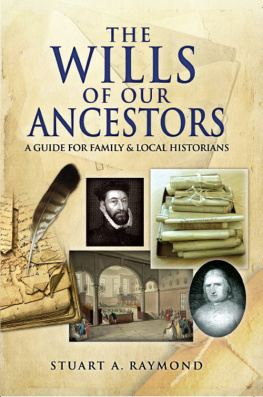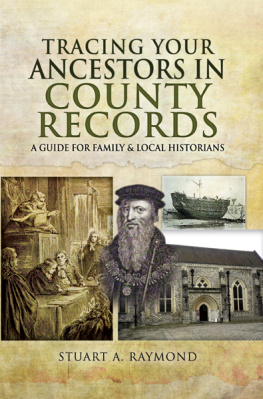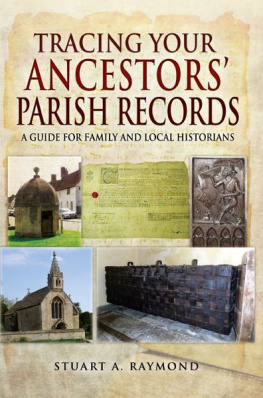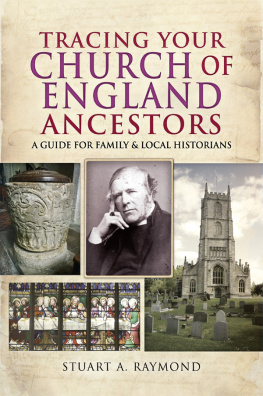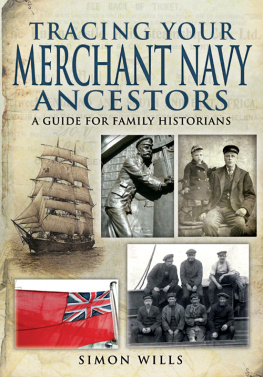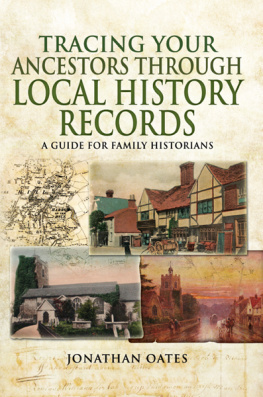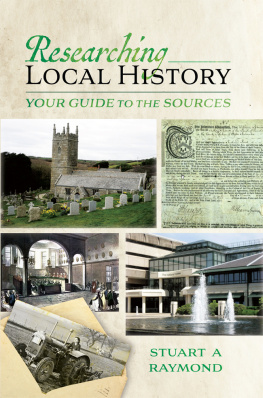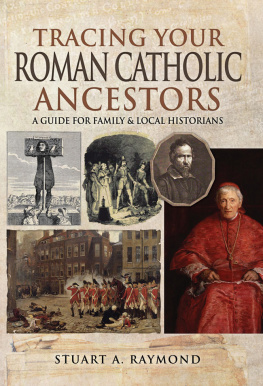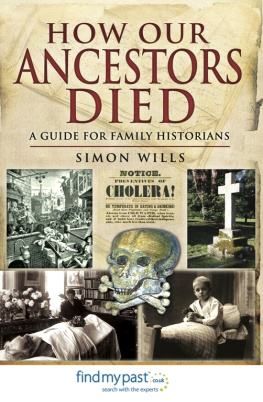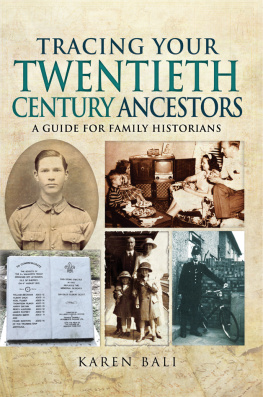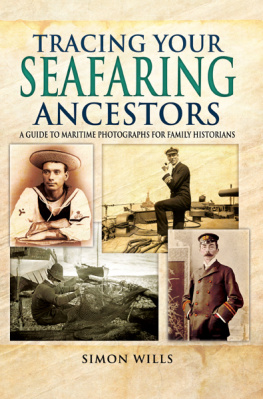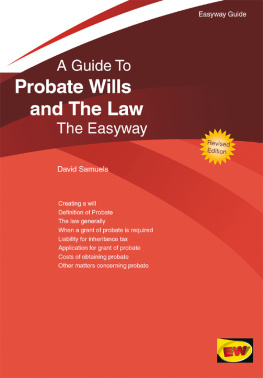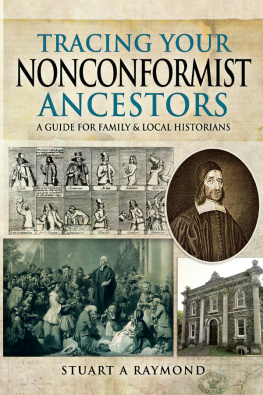FAMILY HISTORY FROM PEN & SWORD
Birth, Marriage and Death Records
David Annal and Audrey Collins
Tracing Your Channel Islands Ancestors
Marie-Louise Backhurst
Tracing Your Yorkshire Ancestors
Rachel Bellerby
The Great War Handbook
Geoff Bridger
Tracing Your Royal Marine Ancestors
Richard Brooks and Matthew Little
Your Rural Ancestors
Jonathan Brown
Tracing Your Pauper Ancestors
Robert Burlison
Tracing Your Huguenot Ancestors
Kathy Chater
Tracing Your East End Ancestors
Jane Cox
Tracing Your Labour Movement
Ancestors
Mark Crail
Tracing Your Ancestors
Simon Fowler
Tracing Your Army Ancestors
Simon Fowler
A Guide to Military History on the
Internet
Simon Fowler
Tracing Your Northern Ancestors
Keith Gregson
Your Irish Ancestors
Ian Maxwell
Tracing Your Northern Irish Ancestors
Ian Maxwell
Tracing Your Scottish Ancestors
Ian Maxwell
Tracing Your London Ancestors
Jonathan Oates
Tracing Family History on the Internet
Christopher Patton
Tracing Your Prisoner of War Ancestors:
The First World War
Sarah Paterson
Tracing Your Tank Ancestors
Janice Tait and David Fletcher
Great War Lives
Paul Reed
Tracing Your Air Force Ancestors
Phil Tomaselli
Tracing Your Second World War
Ancestors
Phil Tomaselli
Tracing Your Secret Service Ancestors
Phil Tomaselli
Tracing Your Criminal Ancestors
Stephen Wade
Tracing Your Legal Ancestors
Stephen Wade
Tracing Your Police Ancestors
Stephen Wade
Tracing Your Jewish Ancestors
Rosemary Wenzerul
Fishing and Fishermen
Martin Wilcox
Tracing Your Canal Ancestors
Sue Wilkes
Tracing Your Lancashire Ancestors
Sue Wilkes

First published in Great Britain in 2012 by
PEN & SWORD FAMILY HISTORY
An imprint of
Pen & Sword Books Ltd
47 Church Street
Barnsley
South Yorkshire
S70 2AS
Copyright Stuart A. Raymond, 2012
ISBN 978-1-84884-785-9
ISBN 9781781594759 (epub)
ISBN 9781781594759 (prc)
The right of Stuart A. Raymond to be identified as the author of this work has been asserted by him in accordance with the Copyright, Designs and Patents Act 1988.
A CIP catalogue record for this book is available from the British Library.
All rights reserved. No part of this book may be reproduced or transmitted in any form or by any means, electronic or mechanical including photocopying, recording or by any information storage and retrieval system, without permission from the Publisher in writing.
Typeset by Concept, Huddersfield, West Yorkshire.
Printed and bound in England by CPI Group (UK) Ltd, Croydon, CR0 4YY.
Pen & Sword Books Ltd incorporates the imprints of
Pen & Sword Aviation, Pen & Sword Family History, Pen & Sword Maritime, Pen & Sword Military, Pen & Sword Discovery, Wharncliffe Local History, Wharncliffe True Crime, Wharncliffe Transport, Pen & Sword Select, Pen & Sword Military Classics, Leo Cooper, The Praetorian Press, Remember When, Seaforth Publishing and Frontline Publishing.
For a complete list of Pen & Sword titles please contact
PEN & SWORD BOOKS LIMITED
47 Church Street, Barnsley, South Yorkshire, S70 2AS, England
E-mail:
Website: www.pen-and-sword.co.uk
CONTENTS
DICKENS ON WILLS AFFECTION OR HATRED?
We naturally fell into a train of reflection as we walked homewards, upon the curious old records of likings and dislikings; of jealousies and revenges; of affection defying the power of death, and hatred pursued beyond the grave, which these depositories contain; silent but striking tokens, some of them, of excellence of heart, and nobleness of soul; melancholy examples, others, of the worst passions of human nature. How many men, as they lay speechless and helpless on the bed of death would have given worlds but for the strength and power to blot out the silent animosity and bitterness, which now stands registered against them in Doctors' Commons!
Charles Dickens, Sketches by Boz
ACKNOWLEDGEMENTS
I have been contemplating a book on this topic for over twenty years, and I am grateful to my publishers for at long last persuading me to do something about it. Simon Fowler commissioned the book, and has provided much useful input. My thanks are also due to Jeremy Gibson, whose book on Probate jurisdictions proved indispensible for the compilation of my list of probate courts. He read an early draft of my text and provided valuable advice.
I am also indebted to the various owners of copyright who have allowed me to reproduce their illustrations. Their names are noted underneath the illustrations. Crown copyright images are reproduced by courtesy of The National Archives, London, England and findmypast.co.uk.
My primary debt, however, is to the editors of the innumerable editions of published probate records listed below, pp. 110-30, whose work I have drawn on extensively.
INTRODUCTION
The Value of Probate Records
Probate records are invaluable sources of information for family and local historians. Wills in particular enable us to get closer to our ancestors than most other documents. They are usually the only official documents available that were written at the express direction of our ancestors, and may provide a detailed insight into their beliefs, their families, and their material life. Sometimes, our ancestors' personalities shine through. When Sir William Trevanion of St Michael Caerhays (Cornwall) made his will in 1512, the high regard he had for his wife Agnes was made evident in his concern that she should, in due course, share his marble tomb, and have her arms displayed on it, provided that she did not remarry.
Other probate documents are also important, and should not be neglected. Inventories list the goods of the deceased; accounts reveal how those goods have been disposed of; administration bonds identify those charged with administering the estates of intestates; the records of disputes in the probate courts provide us with much information about life as seen by the common man. All of these documents give us valuable insights into the daily lives of our ancestors.
Men have been writing wills in England for over a thousand years. They are still being written today. Millions survive, mostly from the mid-fifteenth century onwards, when ecclesiastical probate courts began registering and storing them. They are accompanied by a variety of related documents, such as probate inventories, administration bonds, and executors accounts. Much can be learnt from these documents. For the family historian, they provide invaluable evidence for family relationships. The local historian can find in them much of the information required to reconstruct past communities.
Probate records can be found in many different record offices, both local and national, throughout England and Wales. This book will focus primarily on English and Welsh probate records dating from the medieval era to 1857. In that year, the ecclesiastical probate system was abolished, and a completely new structure was created. Some guidance will be given on using post-1857 wills, and on the probate records of other jurisdictions within the British Isles. Most of the examples given are taken from the published collections of probate records listed below, pp. 11030.
Next page
